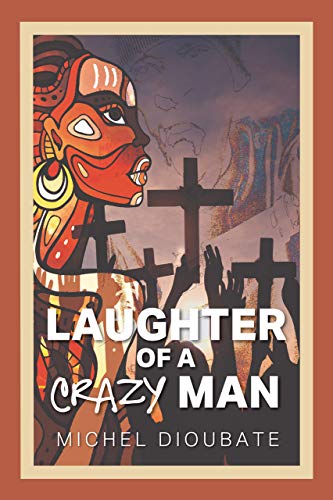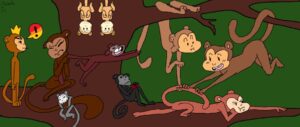
(Used by permission from book, Laughter of a Crazy Man)
It seemed well rehearsed and choreographed. Two ladies, on meeting, suddenly transformed and pretended to be lame and crippled; they jerked, trembled and struggled for balance and finally hugged, and an eruption of laughter started that seemed interminable. I was new to Bong County and Phebe Hospital and asked, “What’s that?” The elder sanitation lady smiled, “You just coming to Bong County. We don’t tell our secrets to Monrovia people.” They continued that performance every time I saw them and refused to tell me for two years until the week I left Liberia.
A friend jokingly asked, “Were you born on Sunday?” And when he got a positive reply, he laughed. Stupid people are born on Sundays. I got good job offers in Monrovia, the capital city; why be silly and go to Bong County in rural Liberia? The salary and prestige were no match for offers in Monrovia and the work gruesome. Yet it created and fostered a superior learning and working environment where I naturally felt at home. My family had immigrated to the US, and I had no plan to join them, which angered my mother, who said I had no ambition other than to be a “doctor turnaround” or a “patch butt doctor” and had buried my bright future. My eyes were set on work in rural Liberia. Operated by the Lutheran Church, the Phebe Hospital functioned as a regional and county hospital. Part of the rural training program, the hospital was constructed and initially supported by the Methodist, Lutheran, and Episcopal Churches but they ran off and left only the Lutherans.
For over thirty years, the Lutheran Church provided the moral fortitude and stamina to keep the doors of the medical center open, which singularly distinguished itself as the only affordable health care facility in rural Liberia for most of the civil war. Located in Suacoco, a town in the heart of Kpelle Country, named after a female Kpelle chief, who was instrumental in asserting the Liberian government control of the region, this institution stood the test of time, but work there was demanding and grinding. No lazy man could work there. Sometimes, patients came in a hammock carried by men who walked a day or more from remote areas with no road network; people came from Guinea, Nimba, Lofa and other counties. The weekend doctor averaged at least five to six emergency surgeries including C-sections, ectopic pregnancies, hernia repair. Work was inexhaustible and demanding, and you were practically begged to take greater responsibility. The experienced doctors joyously taught and instructed to take the load off their backs.
The Kpelle tribe is the largest Liberian tribe and mislabeled as stupid by Liberians for being some of the kindest people in the world. While some disrespected their strong tradition of welcoming strangers, sharing and mutual respect, others cherished the genial disposition of the people as a beacon of goodwill, and it’s no mistake that despite having no major mining concession or industry, the county is better developed than most counties.
Two sons of Bong County returned to offer care as doctors, an ophthalmologist and surgeon. Walter T. Gwenigale, the surgeon, dedicated his life to this endeavor, as the prime mover and rock of Phebe. After training in the US, he returned home in the ’70s to serve his people and has done so since. Dictatorial and demanding, this honest old school surgeon is totally at home in the most Westernized or rural setting.
My first months were challenging. Walking to the outpatient building on my first day of work, I noticed a crowd of people and asked a nurse, “Is this market day or are these people here for market?” She said, “No, they came to see the doctors.” It was unreal, and I had to restrain myself from simply getting in a car and running back to Monrovia; “ALL THESE PEOPLE CAME TO SEE US,” I said, almost yelling. It looked like a marketplace. Later, probably due to the dusty roads on the hospital compound, my asthma worsened, and I started having some serious back pain, something I blamed on the low patient beds at Phebe. Bending to examine and care for patients was a strain. The community support was strong. Until I got settled, my next-door neighbor, Helena Nuahn, sent over food every day despite my protest; Mary Tiah, the nursing boss, and Dr. Flomo, the medical boss, Dr. Borbor on the call team, did everything to make me socially acclimatized to Bong County. Over time, I adjusted so well that the first complaint against me came from the nursing staff that I started rounds so early that the nurses had not done morning notes or checked vitals. Two friends, who were my seniors in medical school, Drs. Williams and Sando, were stationed at Phebe and were worth their weight in gold: they dedicated time welcoming, teaching and mentoring.
The scars of war were evident everywhere, but people were silent, not saying much even when asked. Phebe Hospital was the site of a mass massacre. A mass grave was located near the chapel, and more graves were under a tree in a central garden, graves of innocent employees and patients. One nurse showed the autoclave where she hid to survive the slaughter. Despite this, the people were always friendly and happy. One day, while on call, a young guy brought by his family was examined and admitted. He seemed anxious, uncomfortable but really sick. While walking from the patient to the nursing station, a nurse whispered, “You see that one there; just see how he’s scared lying in the bed. That one of the people who came here to kill us.”
People mentioned the massacre in passing, here and there, but none made a chorus of it. It was tough time for the people. Many patients were bewildered to the point of crying that they had nothing to give or share. “My son,” she said, wringing her hand, “I don’t even have chicken to give you,” a woman remarked in shame after recovery from emergency surgery and was still not reassured after I told her we were well paid, and she had no need to give me anything. After a successful major surgery or delivery, many could not afford the traditional goat, chicken or some “country rice” as appreciation; some could not pay their hospital bill and found it humiliating. The grateful smile of satisfaction provided immeasurable joy and a feeling that no money could buy but this led to a delicate situation. Feeling obligated by tradition, the people gave gifts of a chicken, a goat or produce from their field and were mortified if a kind gift was turned down, but most of the people could not afford it, and gifting was discouraged. More than once, I tactfully declined a chicken or goat and offered to join the family for a hearty meal. Indeed, appreciation of good food and a hearty appetite had its benefits, and the alternative was having people feel you considered yourself too good or civilized to take their gift or interact with them. People were still in a haze trying to recover their personal dignity after humiliation and debasement by rebels, but worst of all, they were unsure the nightmare was over.
A memorable experience was my interaction with a mother after her daughter had a C-section. The wound had healed well. The baby was healthy and sucking well, so, I wrote the discharge note for the nurses and informed her, but she requested to leave the next day. I inquired and learned they could not afford the fee, fifty Liberian dollars, less than three US dollars. I offered to pay, and the mother, who was sitting with her, declined and said she would pay. The hospital policy for indigent patients was to keep them an additional day and discharge them free of charge if they still could not afford it. That evening, I went jogging to the nearby river and saw the mother had mined sand from the river and set them up in piles; she sold it to pay the bill. She wanted no handouts.
My life in the city insulated me from the harsh existence of rural life. Sometimes the difference was so great it appeared the rural setting was another country. Over time, I realized the futility of hospital-based medicine while unhealthy practices and behavior remained in the community. Hospitals functioned as the clearinghouse and did not attack the root of the problems. Many diseases not found along the coast or the cities were prevalent in rural communities. Bong and Lofa Counties in Liberia are epicenters for schistosomiasis, an evil that surely escaped the Pandora’s box of antiquity. Napoleon called Egypt “the land of the menstruating men” when he saw men passing bloody urine due to schistosomiasis. This disease of antiquity was found in mummies over three thousand years old. In Liberia, the epicenter has prevalence similar to that found in Egypt. Long-term side effects include bladder cancer, liver cancer, cirrhosis, kidney disease.
If this was not enough, there were diseases like onchocerciasis, also called river blindness, which added more misery. A small, black gnat-like fly, simulium, bites and introduces the filarial larvae into the skin where it develops into adult filarial worms that lives in nodules. The adult worms produce microfilariae that migrate under the skin. The microfilaria produce itching so intense that sufferers sometimes used red-hot knives or other objects to scratch their skins. Ultimately, the disease causes dry scaly skin and blindness. Of course, not to be surpassed by any was the ever-present scourge of mankind, malaria, spread by mosquitoes that made Africa “the white man’s graveyard” but long before that killed at least a quarter of “the black man children” or newborns. These diseases could be controlled and even eradicated but not by hospital-based medicine. Containment and eradication require money and resources but, most importantly, community partnership and intervention.
We worked and never asked questions but saw telltale signs of a silent war as troops moved toward Guinea to offer secret, undeclared support to dissidents against their government; our leader supported their rebellion. We heard of adventures in Sierra Leone; spoils of war crossed the border, and we treated combatants involved in war there but kept our mouths closed and ears open. A few miles from the hospital was Maleke, where President Taylor took breaks on his farm. A little farther away was Gbartala marine base, a place of fear and torture that would not fit well in any idyllic scenery. More than once, I had torture victims secretly brought over for care.
The receptionist whispered that he wanted to see me. I recognized there was some secrecy involved and walked outside; he followed to take me to a man in tattered clothes who looked worn and sick and appeared to have endured days of torture. I recognized the Ghanaian accent, offered to give him clothes and care and arrange transportation. He bore scars and told a tale of terror, but my offer was declined—seemed like he could not trust another Liberian. He kept glancing in every direction, showed fear as every person or car moved by and talked low. The only thing he wanted was money to go to Monrovia and get to his embassy, which I happily provided. It was a golden opportunity to assist someone from a country that hosted me. I also got a lot of radio messages from Monrovia and quite a few from this assertive social worker at the Lutheran World Service, asking and referring patients with needs to me. She was selfless and limitless in what she asked or requested for her clients. She refused to recognize I had a need and desire for less work. It was no mistake when I heard, many years later, Leymah Bowee nominated and given the Nobel Prize; people with her direction, drive and selflessness win trophies.
When I left, physicians planned weekly rotations at Curran Hospital in Zorzor, Lofa County, a health post supported by the Lutheran Church, and this was scary since we heard reports of renewed hostilities in Lofa. My mindset changed when I realized we were on the verge of another round of fighting. Ten years of war was enough. I called my mother to file documents for emigration to the US. Her answer was “You think I’m stupid. I send documents twice—don’t you know it costs money?” This time, I was serious and did follow up. I could not afford a ticket to California. I lived in the mist of great need and did not ignore it—my sister bought me a ticket. The lady, who roasted corn, teared up when I gave her five US dollars for my usual Friday supply; this was more than the usual extra. She shook her head. “You leaving us.” A few days before leaving Liberia and my best job ever, I cornered the janitorial lady. “You’ve got to tell me the story,” and she realized that this time, I would not accept no. She started smiling; then suddenly became all serious.
It all started after the fall or capture of Gbarnga. Gbarnga, the county seat of Bong County, was the capital city of Greater Liberia. Greater Liberia was what rebel leader Charles Taylor, leader of NPFL, called the area he controlled, which was over 90 percent of the country. The city did not fall overnight. NPFL battled enemy forces and lost territory gradually. Land mines were laid, and LPC paid a high price for success as their leader lost his brother to land mines as they got closer to Bong County. People ran into the bushes and forest to escape the battle; others were cut down by bullets. Various warring factions attacked Taylor and moved in to get the spoils of war. The Suacoco area, where Phebe Hospital was located, was captured by ULIMO.
“Those Mandingo boys [ULIMO] came here, huh; they really know how to loot. They took the hospital truck and other cars and packed it up with looted things.” They knew that Ghangay (Charles Taylor) boys would come back. Before leaving, they called everyone to a big gathering and warned people to leave. “When the rebels come back, they will kill people and say they supported us,” they cautioned. We didn’t believe them. After all, Bong County was Taylor’s home and his base. When Taylor boys came back, there was no real fight because ULIMO had already left. The hospital was open and running fine.
The day started normal; the hospital was crowded with patients, and everything was going fine. From the main entrance, a group of armed men walked toward the hospital complex. The high-pitched chatter and echo of the AK-47 in the nearby trees seemed unreal—there were no enemies to fight. They shot the pastor in the chest and continued toward the building. Next, groups of armed men came from all directions into the compound, shooting indiscriminately at every living thing, and later entered the hospital. The loud staccato of automatic machine gun fire echoed down the halls of the hospital, announcing terror was on the prowl. They went meticulously, room to room, shooting and killing. The anesthetist, Mr. Howard, father of the woman Charles Taylor married later, was also killed. Even the patients on their sick beds were not spared. One of the ladies in the operating room survived when she hid in the autoclave.
While they methodically searched the building, killing and raping, “I ran out with a nurse through the back of the building to the bushes; we went through the bushes and found our way to the leper colony in Suacoco town.” There, we took off our uniforms, the people at the leprosy center gave us a change of clothes and not long after, the rebels came looking for us. “Everybody outside,” they shouted. “Anybody saw nurses or workers from Phebe here?” We came out dressed in the clothes they had given us, walking and acting crippled like people with leprosy. The people said no and suggested that they check the bushes; they went there and volleyed a few shots in that direction and left. Since then, we have dramatized our movement and activities like we did that day and pretended to be crippled by leprosy to avoid being killed. As she completed the story, her eyes were red and watery, and her facial expression was that of one enduring intense pain. Momentarily regretting why I pressured her into telling the story, I realized what the happy, carefree, jovial people of Liberia will not accept: they are a population of traumatized people.
Epilogue
The Fall of Gbarnga, Capital of Greater Liberia NPFL (Charles Taylor) considered his rebel army invincible and his capital city impregnable but slowly lost areas in Grand Bassa County to LPC (Liberia Peace Council, led by George Boley) and Lofa County to ULIMO (United Liberation Movement of Liberia for Democracy, led by Alhaji Kromah). Braving land mines and stiff resistance, LPC moved closer to Gbarnga in a war of attrition that shattered the myth of Taylor’s battlefield invincibility. This newly emboldened group, formed mainly of government soldiers from the thoroughly beaten Armed Forces of Liberia, was muscular in its own ways and matched NPFL in guerilla tactics, bush warfare and survival skills. When LPC made the final push toward the city, ULIMO also attacked from Lofa County, but this was a long trek, and ULIMO lacked well-defined supply lines and reinforcement. When Gbarnga was captured, Taylor was away at a peace conference in Akosombo, Ghana, and true to his crafty nature, he used wisdom to seize victory from the jaws of defeat. At the peace conference, he suggested a national government headed by the (AFL) Armed Forces of Liberia, which technically was not a faction. Hezekiah Bowen, a man of temperance and reliability, fell for the ploy, for very few could resist the temptations and machinations of Charles Taylor. Lt. General Bowen quickly proclaimed, “What God has for you will see your face.” An AFL spokesman was ecstatic and said, “We went hunting for deer and caught an elephant.” The leader of LPC, George Boley, was infuriated and commented, “After ten years of Samuel Doe, the Liberian people don’t want another Krahn man [Hezekiah Bowen] to rule.” LPC had conquered the lion’s share of Bong County and Gbarnga but depended heavily on AFL for support and manpower, and this created a wedge in the relationship. Without support from the rank and file of the AFL (Armed Forces of Liberia, the national army), LPC was no longer able to hold its ground, and there was very little will to continue the fight as NPFL (Charles Taylor’s forces) gradually moved in. ULIMO had no design and was in no position to maintain a sustained campaign and retreated. Taylor launched Operation Envelope and regained lost territory.
Rebel leader Charles Taylor returned to see his mansion looted, with damaged roof, burned cars and walls poked with gunshots. The glowing news from the battlefront was encouraging—only massive retreat of enemy forces. The “running dogs” were scampering away with tails between their legs and offering very little resistance. The people were happy to see Taylor, the devil they knew. He met his generals and only discussed how to harass and chase away the attackers—this was not the time to find out what caused the collapse.
As the dust settled, the rebel leader called in his commanders individually. Kaiser, the commander in Gbarnga, was the last and visibly nervous. Even meeting an old friend, who was part of the long guard, as compared to bodyguard assigned to Taylor, did not raise his spirits. As he sat in the waiting room to be ushered, his friend kept an upbeat conversation with him. “I was worried about you when this Gbarnga trouble started, man. I’m so happy to see you.” Kaiser responded using his nickname but without the enthusiasm. “Gaddafi, I’m worried the papay [a term of endearment for his leader] will kill me.” His friend reassured him that this was not the case since everybody knew the enemy was close by—they came gradually. Kaiser was unconvinced. In this system, there was always a scapegoat.
As Kaiser walked in the room, he was followed by two of his leader’s bodyguards. Taylor stood, left the seat behind his desk to sit opposite Jacobs on one of the chairs in front of his desk. “General, I need to know what happened here and how everything happened.” Jacobs explained how defenders near Gbarnga came under simultaneous attacks from ULIMO and a reinforced LPC that looked coordinated. The LPC group that before appeared to be in check, which his boss knew about before he left the country, was the bigger force, and they overwhelmed us and moved on Gbarnga. The more he detailed what happened, Taylor seemed irritated. Then Taylor said, “Okay, let’s talk about this another time,” but Kaiser saw the sign. Taylor placed his palm on his knee and tapped three times and repeated. This, he knew, was the sign that he should be killed, and he started begging, “Chief, I beg you; don’t kill me.” Two bodyguards guided him outside; his friend, Gaddafi, was tongue-tied and surprised to see him begging and accompanied as he was given a meal and later executed. The suave façade fooled many. Taylor did not have to utter a word to command an execution. Officially, Kaiser was the one who “sold” the defense of the city to the enemy.
With a sleight of hand, Taylor proved his opponents were no match for him. His political maneuvers delivered military dividends bringing considerable pride and an air of invincibility. The Phebe Hospital massacre occurred after NPFL (Taylor) reoccupied Suacoco, a town near Gbarnga, from ULIMO.
© Michel Dioubate, Laughter of a Crazy Man, 2019
- TLC Africa
TLC Africa Online Streaming ServiceLive streaming of Indoor and Outdoor Events
We can stream Live on Facebook or Live Directly to our Streaming Page which requires no login.Contact us today about streaming your next eventTel: +231-886-605-933 |
Terravilla Gardens – Liberia
For all your Flower needs – Bouquets of Flowers, Funeral Blankets, Wreaths and more
Call us at +231770767070 / +231880781874 / WhatsApp on +231 770767070 –
Yes, We Deliver
Visit our website: http://terravillaliberia.com
















